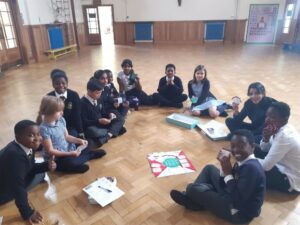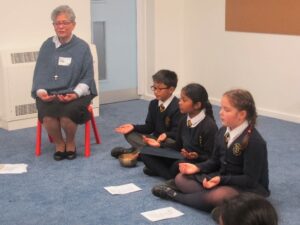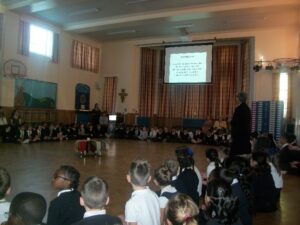Class Masses
For the past four years, we have celebrated mass in an intimate way through class masses for our children and families, which are celebrated with Fr John Cahill on a Monday afternoon scheduled at different points throughout the year.
We have run these masses in a variety of ways:
Pre-pandemic (academic years 2018/19 and 2019/20 until March 2020)
One class from each site came together to celebrate their class mass, the older children guiding the younger children through the mass using a child-friendly version of a mass booklet so that they could come to know the responses to mass more readily and deepen their understanding of what happens when we celebrate the Eucharist. Parents were invited to celebrate mass with their children. Fr John focused on teaching the children about the vestments priests wear for mass and what the garments represent. The children loved seeing Fr prepare for mass in this way, as it is usually done in the sacristy.
Mid-pandemic (from March 2020 to July 2021)
During the height of the pandemic, school masses were cancelled in-line with Government and Diocesan requirements. As restrictions lifted and worship was allowed to resume, we tackled this by celebrating any whole-school masses (such as the Feast of Christ the King) virtually with Fr John celebrating mass in the school hall to one class, socially distanced. This meant that all children could watch the mass and have an opportunity to encounter Christ through prayer, albeit at a safe distance in their classroom bubbles. Unfortunately, parents were not able to join us at school for these events, but any worship was also shared at home via YouTube live.
Once restrictions were further eased, we began celebrating mass in single class bubbles with Fr John in the school hall, of which we held 18 individual masses. We felt it was important for children to come to know the order of mass again after a long period of not attending parish masses during the lockdowns, and most importantly, for children to be able to receive the Eucharist once again. Fr John focussed on teaching the children the correct responses the congregation say during the mass.
Post-lockdown and easing of all restrictions (academic year 2021/22)
Now that all restrictions for schools have thankfully been lifted, we are able to celebrate mass together again and invite parents back into school to receive the Eucharist with their children. This year, we are holding year-group masses (3 classes) so that children can celebrate mass with peers who were not in their lockdown class bubbles. Parents of the year group are invited to attend mass and it has been wonderful to see the children and their families coming together again to share in the joys of our faith.
Fr John is continuing to teach our children the correct responses during the mass as this is an impact we have seen from the lockdowns.
To find out when your child’s year-group mass will be taking place this year, please check our school diary which can be accessed via the homepage.
This term:
Year 6 mass: 27th September 2021 at 2.15pm; Junior Hall
Year 5 mass: 11th October 2021 at 2.15pm; Junior Hall
Year 4 mass: 22nd November 2021 at 2.15pm; Junior Hall





